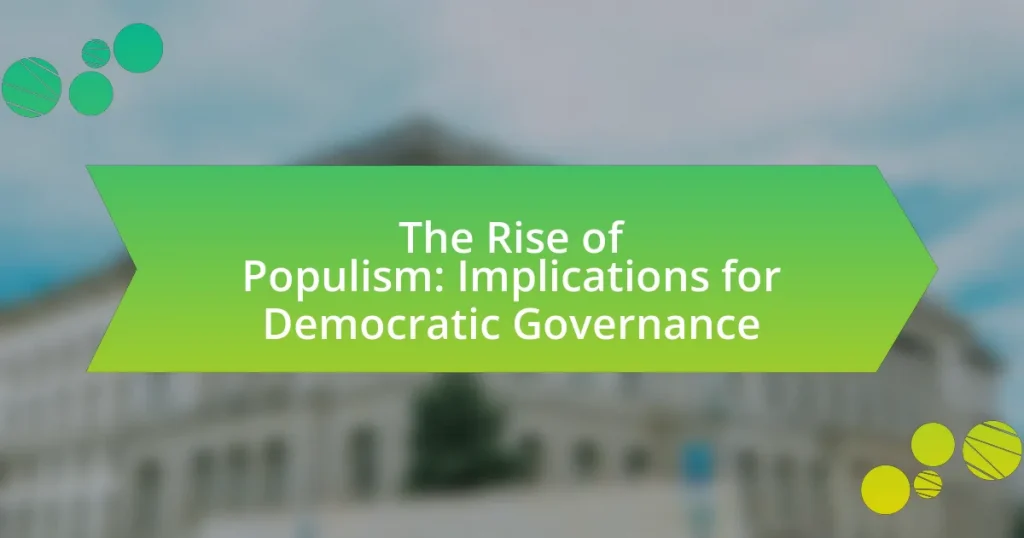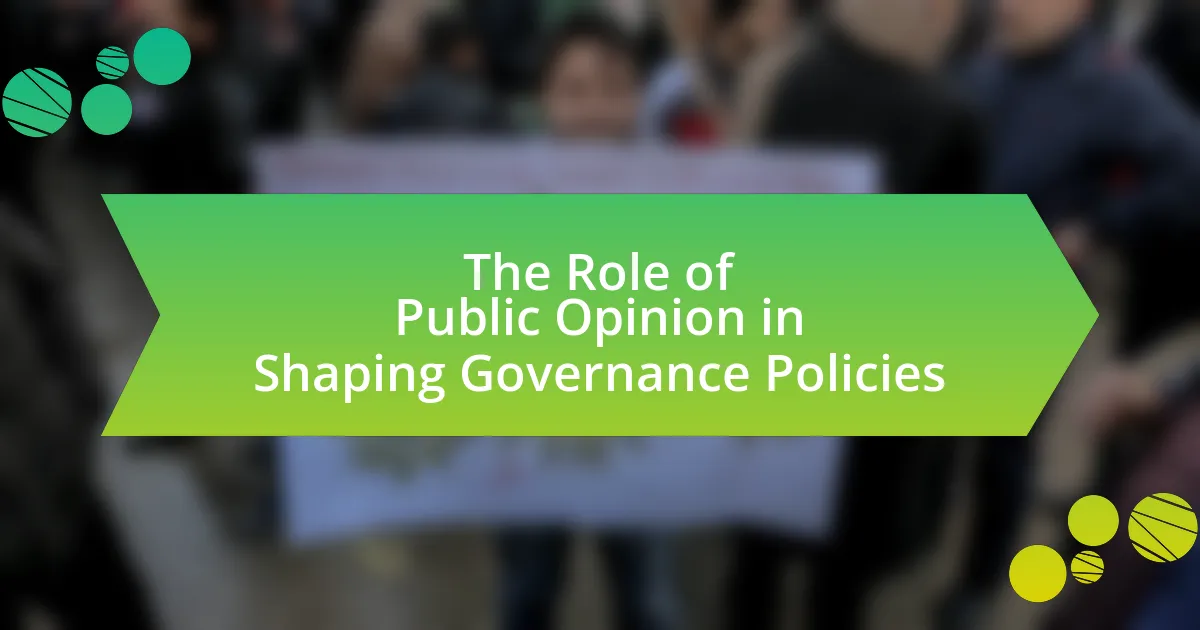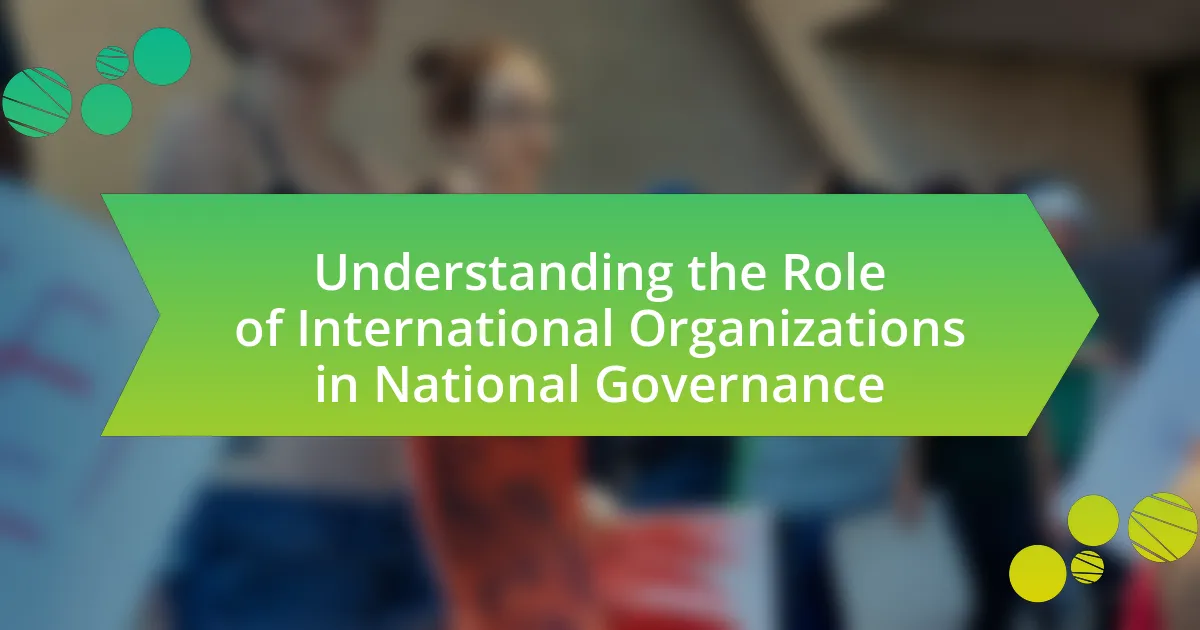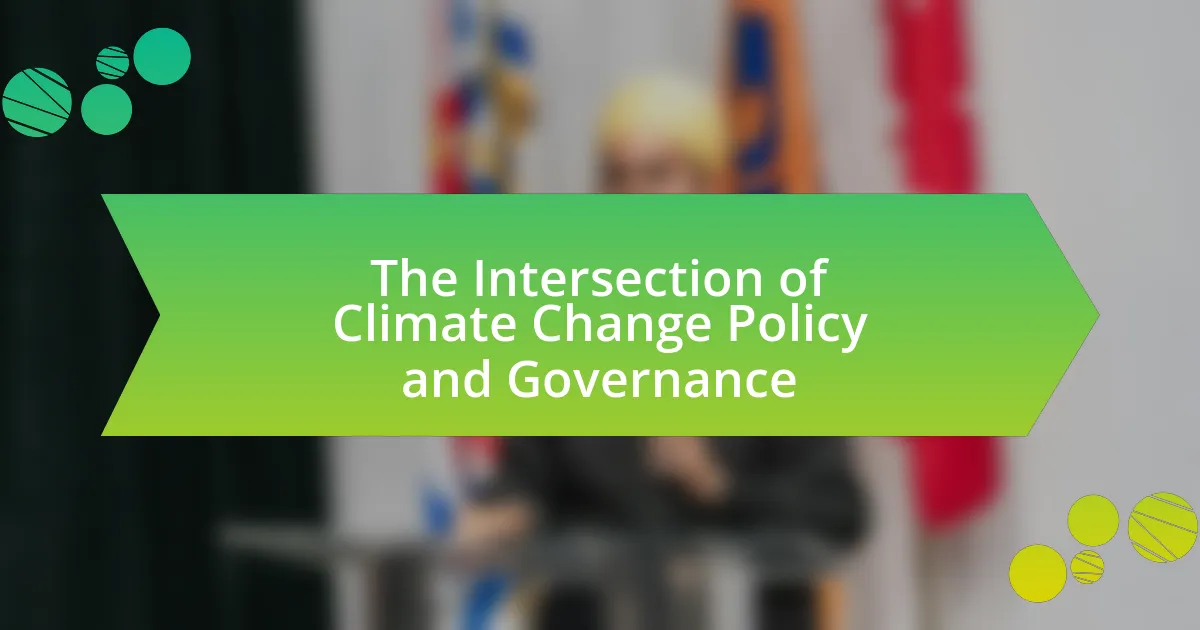Populism is a political approach that seeks to represent the interests of ordinary people against a perceived elite, emerging during times of social, economic, or political upheaval. This article examines the defining characteristics of populism, including its anti-elitist rhetoric and differentiation from traditional political parties. It explores historical factors contributing to the rise of populism, such as economic crises and social changes, and discusses its implications for democratic governance, including the erosion of institutional checks and balances and the risks to minority rights. Additionally, the article outlines strategies for democratic societies to respond to populism, emphasizing the importance of strengthening institutions, promoting civic engagement, and fostering inclusive political dialogue.
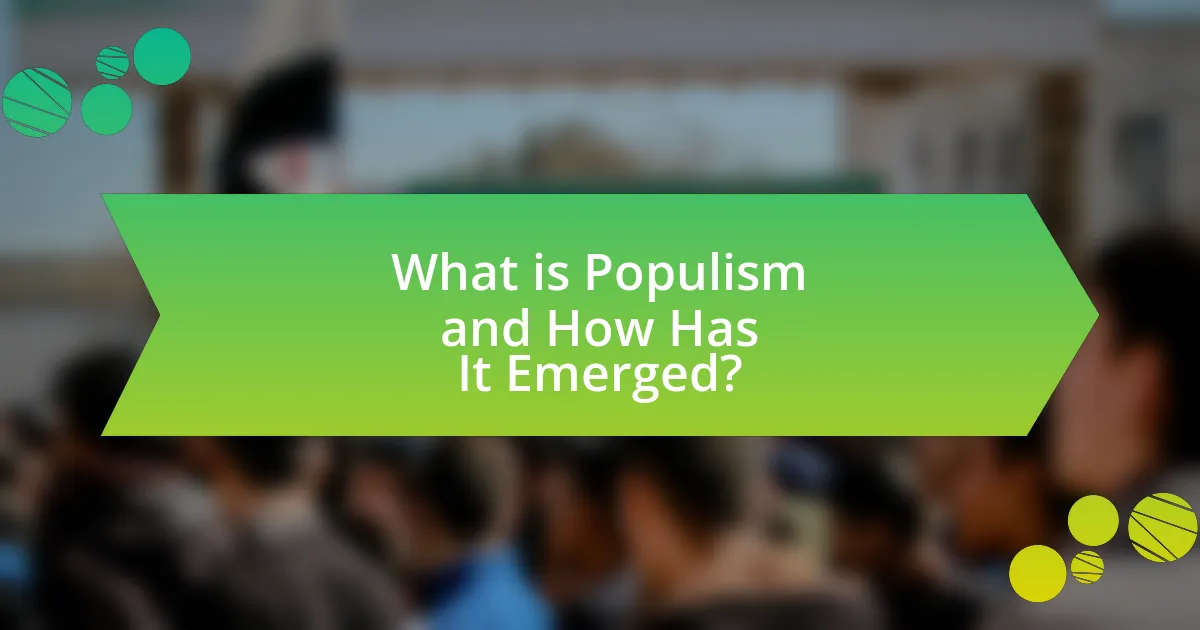
What is Populism and How Has It Emerged?
Populism is a political approach that seeks to represent the interests of ordinary people, often contrasting them against a perceived elite or establishment. It has emerged in various forms throughout history, typically during times of social, economic, or political upheaval, where discontent with traditional political institutions is prevalent. For instance, the rise of populist movements in the late 19th century in the United States, such as the People’s Party, was a response to economic distress among farmers and laborers. More recently, the global financial crisis of 2008 catalyzed a resurgence of populism, as seen in the election of leaders like Donald Trump in the U.S. and the Brexit vote in the U.K., reflecting widespread dissatisfaction with established political norms and economic inequality.
What are the defining characteristics of populism?
Populism is characterized by a dichotomy between “the people” and “the elite,” emphasizing the idea that society is divided into two antagonistic groups. This ideology often manifests through a charismatic leader who claims to represent the will of the common people against a corrupt establishment. Additionally, populism typically involves a strong anti-establishment sentiment, advocating for the interests of ordinary citizens while criticizing political elites and institutions. Historical examples include leaders like Hugo Chávez in Venezuela and Donald Trump in the United States, who both utilized populist rhetoric to mobilize support by appealing to grievances against perceived elite control.
How do populist movements differentiate themselves from traditional political parties?
Populist movements differentiate themselves from traditional political parties primarily by positioning themselves as representatives of the “common people” against a perceived corrupt elite. Unlike traditional parties, which often adhere to established ideologies and institutional frameworks, populist movements emphasize direct appeal to the masses, often utilizing charismatic leadership and simplified messaging to mobilize support. For example, leaders like Donald Trump in the United States and Jair Bolsonaro in Brazil have employed anti-establishment rhetoric to galvanize their bases, framing their campaigns around the idea of restoring power to ordinary citizens. This approach is supported by research indicating that populist movements thrive in environments where there is widespread disillusionment with traditional political institutions, as seen in various global contexts where voter turnout for populist candidates has surged during economic or political crises.
What role does anti-elitism play in populist rhetoric?
Anti-elitism serves as a foundational element in populist rhetoric by positioning the populist leader as a voice for the “common people” against a perceived corrupt elite. This dynamic fosters a sense of unity among supporters who feel marginalized by established political and economic systems. For instance, populist movements often highlight disparities in wealth and power, framing elites as out of touch with the struggles of ordinary citizens, which resonates with voters seeking change. Historical examples include the rise of leaders like Donald Trump in the United States and Jair Bolsonaro in Brazil, who both utilized anti-elitist narratives to galvanize support by criticizing political establishments and advocating for the interests of the average citizen. This rhetoric effectively mobilizes discontent and reinforces the populist claim to represent the true will of the people against elite interests.
What historical factors have contributed to the rise of populism?
The rise of populism has been significantly influenced by historical factors such as economic inequality, political disenfranchisement, and social upheaval. Economic inequality, particularly during periods of recession or financial crisis, has led to widespread discontent among the populace, prompting calls for leaders who promise to represent the “common people” against the elite. For instance, the Great Depression in the 1930s saw the emergence of populist movements as economic hardship fueled demands for change. Political disenfranchisement, where segments of the population feel excluded from the political process, has also contributed to populism; this was evident in the rise of populist leaders in Latin America during the late 20th century, who capitalized on the frustrations of marginalized groups. Additionally, social upheaval, such as demographic shifts and cultural changes, has created fertile ground for populist rhetoric, as seen in the rise of right-wing populism in Europe in response to immigration and globalization. These historical factors collectively illustrate how economic, political, and social dynamics have shaped the landscape for populism.
How have economic crises influenced populist sentiments?
Economic crises have significantly amplified populist sentiments by creating widespread discontent and distrust in established political institutions. During economic downturns, such as the 2008 financial crisis, unemployment rates soared, and public dissatisfaction with traditional parties increased, leading to a rise in populist movements that promise to address the grievances of the “common people.” For instance, in the aftermath of the 2008 crisis, countries like Greece saw the emergence of parties like Syriza, which capitalized on economic hardship and anti-austerity sentiments, reflecting a broader trend where economic instability fosters a fertile ground for populist rhetoric that blames elites and advocates for radical change.
What social changes have facilitated the growth of populist movements?
Social changes that have facilitated the growth of populist movements include increasing economic inequality, widespread disillusionment with traditional political parties, and the rise of digital communication platforms. Economic inequality has led to a perception among many that the political elite are disconnected from the struggles of ordinary citizens, fostering resentment and a desire for alternative political solutions. Disillusionment with traditional parties stems from their inability to address pressing social issues, prompting voters to seek out populist leaders who promise to represent the “common people.” Additionally, digital communication platforms have enabled populist messages to spread rapidly, allowing leaders to bypass traditional media and directly engage with supporters, further amplifying their reach and influence. These factors collectively create an environment conducive to the rise of populist movements.
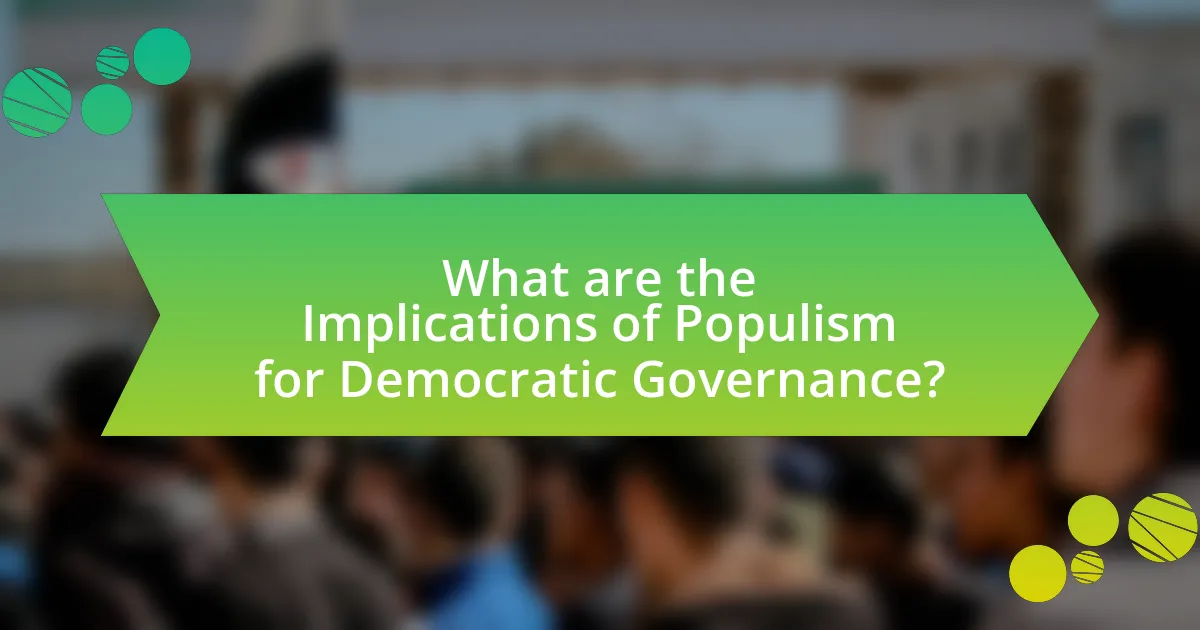
What are the Implications of Populism for Democratic Governance?
Populism can undermine democratic governance by eroding institutional checks and balances. Populist leaders often centralize power, bypassing traditional democratic processes and diminishing the role of independent institutions, such as the judiciary and media. For instance, in Hungary, Prime Minister Viktor Orbán has implemented measures that weaken judicial independence and restrict media freedom, which has raised concerns about the health of democracy in the country. Additionally, populism can polarize societies, leading to increased political division and social unrest, as seen in the United States during the Trump administration, where populist rhetoric intensified partisan conflicts. These implications highlight the potential risks populism poses to the stability and functionality of democratic systems.
How does populism challenge established democratic norms?
Populism challenges established democratic norms by undermining the principles of pluralism and institutional checks and balances. Populist leaders often claim to represent the “true will of the people,” which can lead to the delegitimization of political opposition and minority rights. For instance, in Hungary, Prime Minister Viktor Orbán has implemented measures that weaken judicial independence and restrict media freedom, thereby consolidating power and eroding democratic institutions. This trend is evident in various countries where populist movements have gained traction, as they frequently prioritize majoritarian rule over democratic deliberation, threatening the foundational aspects of liberal democracy.
What impact does populism have on political institutions?
Populism significantly undermines political institutions by eroding democratic norms and increasing polarization. Political leaders who adopt populist rhetoric often challenge the legitimacy of established institutions, such as the judiciary and the media, framing them as corrupt or elitist. For example, in Hungary, Prime Minister Viktor Orbán has systematically weakened judicial independence and curtailed press freedoms, which illustrates how populist governance can lead to the deterioration of checks and balances. Additionally, populism tends to foster a divisive political climate, as seen in the United States during the Trump administration, where populist strategies intensified partisan divides and undermined bipartisan cooperation. This impact on political institutions can lead to a decline in public trust and a weakening of democratic governance overall.
How does populism affect the rule of law and judicial independence?
Populism undermines the rule of law and judicial independence by promoting the idea that the will of the majority supersedes legal frameworks and institutional checks. This often leads to the erosion of judicial authority, as populist leaders may seek to appoint loyalists to key judicial positions, thereby compromising impartiality. For instance, in Hungary, the government has implemented reforms that weaken the Constitutional Court’s power, illustrating how populist governance can directly impact judicial independence. Additionally, populist rhetoric frequently portrays judges as obstacles to the people’s will, fostering a climate where judicial decisions are disregarded or attacked, further destabilizing the rule of law.
What are the potential benefits and drawbacks of populism in a democracy?
Populism in a democracy can provide benefits such as increased political engagement and representation of marginalized voices, while drawbacks include the potential for undermining democratic institutions and fostering division. Increased political engagement occurs as populist movements often mobilize citizens who feel disenfranchised, leading to higher voter turnout and participation in the political process. For instance, the rise of populist leaders in various countries has been linked to a surge in grassroots activism and public discourse. However, the drawbacks manifest when populist leaders challenge established norms and institutions, which can erode checks and balances essential for democracy. Historical examples include the rise of authoritarianism in countries like Venezuela under Hugo Chávez, where populism led to the concentration of power and diminished democratic freedoms.
How can populism enhance political engagement among citizens?
Populism can enhance political engagement among citizens by fostering a sense of inclusion and urgency regarding political issues. This political approach often emphasizes the voice of the “common people” against the elite, motivating individuals to participate in political discourse and activities. For instance, populist movements have been shown to mobilize previously disengaged demographics, as seen in the rise of populist parties in Europe and the Americas, where voter turnout increased significantly during elections influenced by populist rhetoric. Research indicates that populist leaders often utilize direct communication methods, such as social media, to engage citizens, making political processes more accessible and relatable. This direct engagement can lead to heightened awareness of political issues and increased participation in democratic processes, as evidenced by the surge in grassroots movements and local activism associated with populist agendas.
What risks does populism pose to minority rights and pluralism?
Populism poses significant risks to minority rights and pluralism by promoting a majoritarian perspective that often marginalizes diverse groups. This approach can lead to the erosion of legal protections for minorities, as populist leaders may prioritize the will of the majority over the rights of minority populations. For instance, in Hungary, the rise of populist governance has resulted in policies that undermine the rights of ethnic minorities and refugees, reflecting a broader trend where populist movements seek to consolidate power by appealing to nationalistic sentiments. Such actions threaten the foundational principles of pluralism, which rely on the recognition and protection of diverse identities and viewpoints within a society.
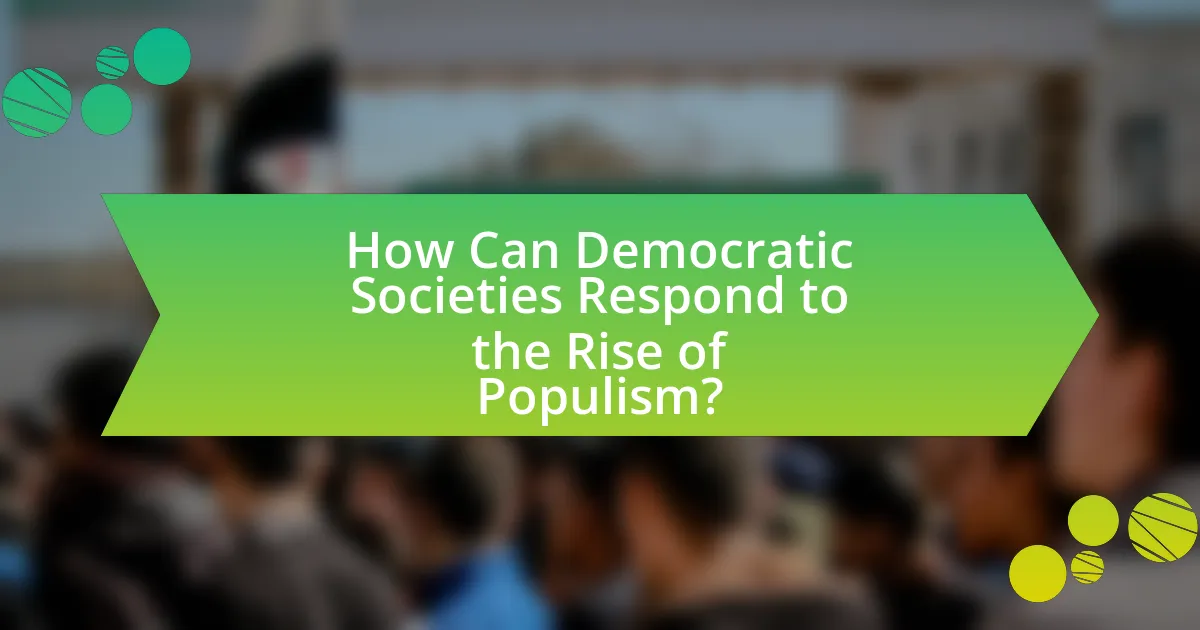
How Can Democratic Societies Respond to the Rise of Populism?
Democratic societies can respond to the rise of populism by reinforcing democratic institutions and promoting inclusive political dialogue. Strengthening institutions such as the judiciary, electoral bodies, and media can help maintain checks and balances that populist movements often challenge. For instance, the European Union has emphasized the importance of rule of law and democratic norms in member states facing populist threats, demonstrating that institutional resilience is crucial. Additionally, fostering inclusive dialogue that addresses the concerns of marginalized groups can mitigate the appeal of populism, as seen in countries like Canada, where policies aimed at reconciliation and inclusion have countered divisive rhetoric.
What strategies can be employed to mitigate the negative effects of populism?
To mitigate the negative effects of populism, strategies such as promoting inclusive political dialogue, enhancing civic education, and strengthening democratic institutions can be employed. Inclusive political dialogue encourages participation from diverse groups, reducing polarization and fostering understanding. Enhancing civic education equips citizens with critical thinking skills, enabling them to discern misinformation and engage constructively in democratic processes. Strengthening democratic institutions, such as independent judiciaries and free media, ensures accountability and transparency, which are essential for countering populist narratives that often thrive on distrust in established systems. These strategies have been supported by research indicating that robust democratic frameworks can effectively counteract the divisive nature of populism.
How can political parties adapt to the challenges posed by populism?
Political parties can adapt to the challenges posed by populism by enhancing their engagement with grassroots movements and addressing the concerns of marginalized groups. This approach allows parties to reconnect with voters who feel alienated by traditional political structures. For instance, research indicates that parties that prioritize local issues and foster direct communication with constituents can mitigate the appeal of populist rhetoric. A study by the European Parliament in 2020 found that parties that actively involve citizens in decision-making processes are more successful in countering populist narratives. By focusing on transparency, accountability, and inclusivity, political parties can effectively respond to the rise of populism and strengthen democratic governance.
What role does education play in countering populist narratives?
Education plays a crucial role in countering populist narratives by fostering critical thinking and media literacy among individuals. By equipping people with the skills to analyze information and discern credible sources, education helps mitigate the influence of misinformation often propagated by populist movements. Studies indicate that higher levels of education correlate with increased skepticism towards populist rhetoric, as educated individuals are more likely to question oversimplified solutions and emotional appeals. For instance, research by the Pew Research Center shows that individuals with a college degree are less susceptible to populist ideologies compared to those with lower educational attainment. Thus, education serves as a foundational tool in promoting informed citizenship and resilience against divisive populist messages.
What best practices can strengthen democratic resilience against populism?
Strengthening democratic resilience against populism can be achieved through promoting inclusive political dialogue and enhancing civic education. Inclusive political dialogue fosters engagement across diverse societal groups, reducing polarization and building consensus. For instance, countries like Canada have implemented participatory budgeting processes that involve citizens in decision-making, which has led to increased trust in government and reduced populist sentiments. Enhancing civic education equips citizens with critical thinking skills and knowledge about democratic processes, making them less susceptible to populist rhetoric. Research by the National Endowment for Democracy indicates that informed citizens are more likely to engage in constructive political discourse and resist divisive narratives.
How can civic engagement initiatives promote democratic values?
Civic engagement initiatives promote democratic values by fostering active participation in the political process, which enhances accountability and representation. These initiatives, such as community organizing, public forums, and voter education campaigns, empower citizens to voice their opinions and influence decision-making. Research indicates that increased civic participation correlates with higher levels of trust in government and stronger democratic institutions. For example, a study by the National Civic League found that communities with robust civic engagement programs experienced improved governance outcomes and greater public satisfaction with local leadership.
What lessons can be learned from countries that have successfully navigated populism?
Countries that have successfully navigated populism demonstrate the importance of maintaining strong democratic institutions and fostering inclusive political dialogue. For instance, nations like Canada and New Zealand have emphasized the need for robust checks and balances, which help mitigate the risks associated with populist movements. In Canada, the government has focused on engaging diverse communities and addressing their concerns, thereby reducing the appeal of populist rhetoric. Similarly, New Zealand’s emphasis on transparency and accountability in governance has strengthened public trust and diminished the influence of populist leaders. These examples illustrate that prioritizing democratic values and inclusive governance can effectively counteract the divisive nature of populism.
What practical steps can citizens take to uphold democratic governance in the face of populism?
Citizens can uphold democratic governance in the face of populism by actively participating in the political process, advocating for transparency, and promoting civic education. Engaging in voting, attending town hall meetings, and joining civic organizations empowers citizens to influence decision-making and hold leaders accountable. Research indicates that increased civic engagement correlates with stronger democratic institutions, as seen in countries where grassroots movements have successfully challenged populist narratives. Furthermore, advocating for transparency in government actions helps to combat misinformation and fosters trust in democratic processes. Promoting civic education ensures that citizens understand their rights and responsibilities, which is crucial for resisting populist rhetoric that undermines democratic values.
